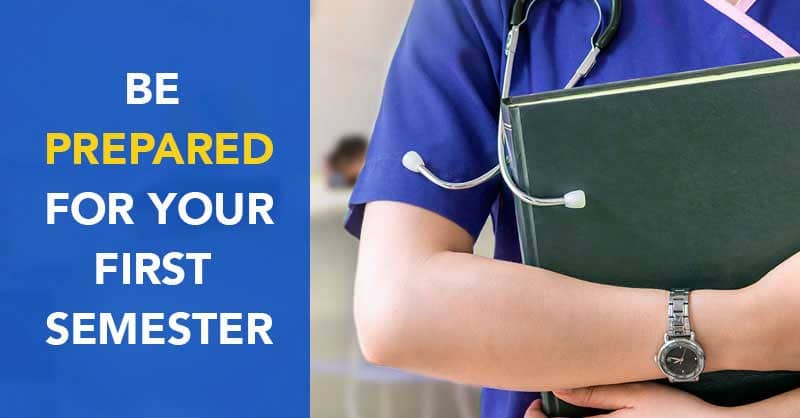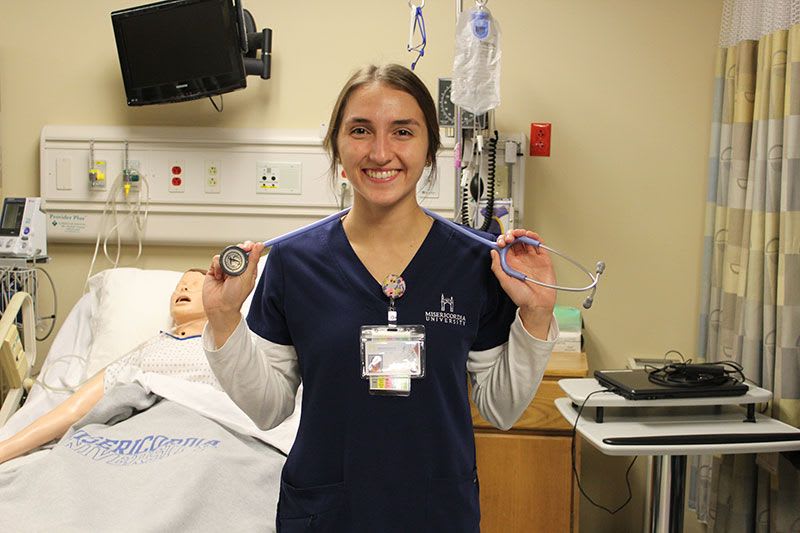What to Expect First Semester of Nursing School and Beyond
Each blog post is dated and contains accurate information as of that date. Certain information may have changed since the blog post publication date. If you would like to confirm the current accuracy of blog information, please visit our ABSN overview page or contact admissions at (866) 885-6337.

Prerequisites: Check. Paperwork: Check. Health screenings and immunizations: Check.
You completed all the necessary steps and have been accepted into the Misericordia University Accelerated Bachelor of Science in Nursing (ABSN) program. Congrats! Now what?
You have a general idea of what to expect in nursing school from talking with your admissions counselor. Now the reality is finally starting to set in: First semester is fast approaching. You’re going to start nursing school soon!
The first semester of nursing school lays the groundwork for your nursing education, providing the knowledge and skills necessary for a smooth transition into later semesters — and ultimately your nursing career. Below, we delve into how to prepare for your first semester of nursing school as a Misericordia University ABSN student.
We’ll cover what to expect from your first semester as a Misericordia University ABSN student as well as offer tips for how to succeed in nursing school.
Your First Semester of Nursing School Will Focus on Coursework and Labs
When we say our program is accelerated, we mean it. The Misericordia ABSN program condenses 36 months’ worth of content into a 16-month curriculum. But just because our program is shorter in duration doesn’t mean we skimp on teaching you valuable nursing theory and skills. During the first of four full-time semesters, you’ll complete the following theory courses online and skills-based courses at our nursing education center in Pittsburgh:
- NSG 201 Foundations Essential to Professional Nursing Practice (3 credits)
- NSG 305 Physical Assessment (3 credits)
- NSG 300 Conceptual Basis of Nursing Practice (2 credits)
- NSG 320 Principles of Pharmacology (3 credits)
- RLS 104 World Religions/Core Course Requirement for Transfer Students* (3 credits)
*The RLS 104 World Religions course is a placeholder for any core course requirement a transfer student still needs. We require this credit to remain at full-time status for the semester.
What is the toughest course the first semester of nursing school?
While the answer to this question depends on your prior academic background, many students say the material covered in pharmacology can be challenging because it involves learning a long list of drugs in a short time frame. To increase your odds of succeeding in this course, work with a Misericordia ABSN success coach to devise study strategies that work best for you.
How do I study for nursing school exams?
The keys to success on nursing school exams are creating a consistent study schedule and forming study groups with your peers. You’ll feel retain more information when you break up material into smaller increments over time versus cramming the night before. Plus, studying with others helps foster deeper learning of tough concepts.
What is the first semester of nursing school like?
The first semester of nursing school will pose a test of your ability to stay organized, as well as challenge you to rapidly take on new information that you will build on throughout the course of each of the following semesters. Reach out to your instructors and fellow cohort members for help and support, and there’s no reason why you can’t succeed as a first-semester nursing student.
Online nursing courses
Compared to a traditional classroom-based BSN program, our ABSN program covers much of the same material that will ready you to become a caring, competent nurse. That’s where the similarities end. What sets our ABSN program apart from these programs, besides speed, is course delivery.
Instead of driving to a campus to attend class, you’ll log into Canvas, an interactive e-Learning platform, to complete a majority of your nursing theory courses. Among other things, this online learning environment allows you to:
- Read and listen to nursing coursework material.
- Watch videos about nursing concepts.
- Take part in simulated learning activities.
- Complete course assignments.
- Interact with instructors and other students via discussion forums and scheduled chat sessions.
Online learning gives you the option to learn whenever and wherever is best for you — whether that’s 3 a.m. at home before the kids wake up or 3 p.m. at a coffee shop. This learning format affords you scheduling flexibility, but be ready to dedicate a lot of time to your studies each week.
Nursing school success tips: coursework
- Stay focused: The best way to describe our ABSN program is by comparing it to a full-time job. For that reason, we recommend holding off on extended vacations or taking on a full-time job during the 16 months you’re enrolled in the program.
- Learn how you study: Your success in nursing school hinges on your ability to understand, not just memorize, material. Taking a VARK learning style assessment early in nursing school can help you identify your ideal studying method. Doing so can help you not only retain material but apply it in patient care scenarios.
- Stay organized: The ABSN program compresses so much material into an abbreviated timeframe, making it extra important to stay on top of your online coursework. A planner will definitely be among your must-have nursing school supplies as you map out your daily schedule, blocking off more than enough time to study.
- Utilize faculty: Just because your nursing theory coursework is online doesn’t mean you’re going through it alone! As soon as you feel you might need help, reach out to your instructor for clarification. It’s also a good idea to form a study group with your classmates to share and compare notes.
Labs
Completed simultaneously with the online nursing theory coursework, the lab portion of your nursing education comprises two components: skills and simulations.

Both take place inside our ABSN nursing education center in Pittsburgh. We designed this space to replicate a clinical setting for you to put theory and nursing interventions into practice under the guidance of faculty. Our education center is filled with things every nursing student should have, from supplies to training equipment that will prepare you for real clinical environments.
During first-semester skills labs, you’ll start to feel like a nurse, just without the risk. That’s because you’ll practice core nursing skills ranging from catheterization to wound care on a clinical task trainer or full-body manikin.
Then, as part of nursing simulation labs, you’ll apply your skills and knowledge into the context of a realistic patient care scenario. Here you’ll also hone valuable problem solving, collaboration and critical thinking skills and debrief with faculty and classmates.
While simulated, these scenarios can still get intense. Don’t worry — we won’t throw you into the deep end on the first day. During your first semester, expect these labs to focus on nursing basics.
Nursing school success tips: simulation and skills labs
- Take advantage of onsite resources: We make the labs in our nursing learning center available to you outside of scheduled course times — use them! Our computer labs and the student lounge are also here to help you succeed.
- Ask questions: Now is your time to speak up! Don’t be afraid to solicit feedback from your instructors during simulation debriefings and skills lab sessions.
- Don’t be afraid to make mistakes: It’s unlikely you’ll master all the key nursing skills you’ll need to excel in the field right away. That’s why our simulation manikins exist — for you to practice and learn without fear of putting anyone’s safety at risk.
How To Prepare for Your First Semester of Nursing School
From online courses, to onsite skills and simulation labs and clinical rotations, your first semester of nursing school will be filled with new experiences. Every part of the curriculum, especially in an accelerated nursing program like Misericordia ABSN, is crucial in the first semester. Your first semester knowledge will form a foundation for you to continue to learn and succeed, so being prepared will be a top priority in earning your degree and becoming a practicing nurse. After going through the admissions process and earning your acceptance into a nursing program, it’s time to prepare yourselves with the habits and resources you’ll need in order to complete your first round of nursing courses.

Nursing school success tips: your first semester
- Adjust your schedule: Your first semester of nursing school will be extremely busy, and the best time to form new habits is before you begin your coursework. Take a look at your schedule, and mark out time that you’ll be able to spend studying. You’ll have to work hard in order to earn your degree, so having enough time to study will be a vital step when preparing for your first semester.
- Connect with your fellow cohort members: You won’t be starting your first semester of nursing school alone. Your fellow cohort members will be going through the same rigorous curriculum as you, so you’ll find you will have plenty in common with them as you dive into your first semester. Reach out and you’ll find plenty of study partners ready to help cheer one another on.
- If you’ve relocated, settle into your new city: If you relocate for your nursing program, like many do through Misericordia’s ABSN program, a new city on top of a new school experience will take some getting used to. Explore the city while you wait to start classes, and you’ll feel more comfortable in your new environment.
You’ll still continue your lab- and online-based courses during later semesters in the program, but prepare to add on an element vital to your future nursing career: clinical experiences.
Are you ready to see if you qualify for our ABSN program and make your dream of becoming a nurse a reality? Reach out to one of our admissions counselors today to get the ball rolling!
